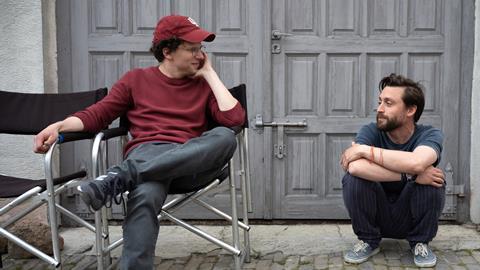During the production of A Real Pain, Kieran Culkin’s loose approach frequently collided with director Jesse Eisenberg’s meticulous planning
It is “extremely rare”, says Kieran Culkin, for him to instantly click with a role. But that is what happened with the character of Benji Kaplan in Jesse Eisenberg’s A Real Pain. “The moment I saw Benji start talking [in the screenplay], I thought, ‘I understand this guy. This thing’s great,’” says Culkin. “So I was all in.”
It is not hard to see why. The role seems perfectly tailored for the 42-year-old who, having acted since childhood, has thrived in parts that cast him as entertainingly difficult men. Benji is troubled yet assured, spiky yet charming, infuriating yet almost admirably honest. On a Polish holocaust tour vacation with his Jewish cousin David (Eisenberg), he wrestles with both his grief at the death of their grandmother and his profound sense of purposelessness, while encouraging his tightly wound cousin to just try and live a little.
As a family member, he lives up to the film’s title – not entirely unlike Roman Roy in HBO hit Succession, the defining role of his career so far for which Culkin won both a Primetime Emmy and a Golden Globe. Not that Eisenberg had seen it.
Soon after they started shooting on location in Poland, Culkin learned that, despite offering him the role without an audition, his director and co-star had never seen a single episode of the series. Not only that, Culkin relates, “He hadn’t seen me on stage. He hadn’t seen a single movie I’m in.”
Eisenberg, it turned out, had cast him purely on the strength of a recommendation by his sister, who was a Succession fan and, like the actor himself, pictured Culkin as Benji when she first read A Real Pain. “I told Jesse, ‘That’s fucking weird! You offered somebody a part without auditioning them or seeing them do any work whatsoever!’” He laughs. “That’s ultimate trust in his sister.”
While that trust certainly paid off, Culkin’s first role since Roman Roy – on a shoot that started mere weeks after Succession’s fourth and final season wrapped – presented him with something of a challenge. After years of doing things the Succession way, with roving cameras, no marks and much on-camera spontaneity and improvisation, his instinctive style initially rubbed up against Eisenberg’s careful preparation and scene-planning.
“I found it a bit challenging to go back into doing coverage and hitting a mark,” says Culkin. “Jesse had pretty much shot the whole movie on his phone before I got there, and I found that really intimidating. I was like, ‘How do you know I’m going to sit there?’ He said, ‘What do you mean?’ I’m like, ‘Well, we haven’t rehearsed it. How do you know I’m going to sit there?’ ‘Because it works for the shot.’
“So I had to adjust; fine, Kieran, let it go, sit in the damn chair because it works for his shot. I tried my best to work in his structure, but he adapted to my way a bit, too. He loosened up and let me try some things.” (Many of which, Eisenberg has admitted in interviews, made the film better.)
Creative tension

Screen International points out that this creative tension, between rigorous structure and freewheeling spontaneity, echoes the relationship between Eisenberg and Culkin’s characters: the control freak and the agent of chaos, if you will.
“That’s very interesting,” he says. “I never considered that, if David and Benji made a movie together, it would probably be quite similar. I mean, it seems obvious now you’ve said it…”
Culkin is not an actor who likes to analyse his roles, or even dissect his process in approaching them. There is one scene in A Real Pain where an exasperated David nails his cousin in a single line, describing him as someone who can light up a room, then shit on everyone inside it. How, we ask, did he even begin thinking about how to embody that?
“A lot of actors would love a description like that and go, ‘Mmm, I’m going to study that.’ But there was a part of me that wished that [line] wasn’t in the movie,” admits Culkin.
To think about it would have been distracting. “It’s like, there are seven things you have to think about when it comes to your golf swing. But if you think about one of them, you’re going to fuck it up, right? If I were to try to understand why Benji is this way, and how people perceive him, I would be giving myself a lot of busy work. That’s completely unnecessary when I can just go in there, do it, work off Jesse… And maybe, if I feel like it, analyse it later.”
Happy ending
As Culkin’s first step forward in a post-Succession career, A Real Pain – which was picked up by Searchlight Pictures after its Sundance launch, and has already earned the actor a New York Film Critics’ Circle award and a Golden Globe nomination for supporting actor – is encouraging, to say the least. And, while Culkin evidently misses working on Jesse Armstrong’s acerbic satire, he laments neither the show ending nor departing the role of Roman.
“It was a dream job,” he says. “We had some of the most brilliant writers ever, and they also came with very little ego; there was no bully, there was no asshole. And then I got these scene partners like Sarah Snook and all these lovely people. So why wouldn’t you want it to continue on? But I took the position, ‘If Jesse says it’s the end, it’s because he knows best. He has not led us astray the whole time.’
He adds: “I would have felt weird if he said, ‘We should have ended it here, but let’s do [season] five anyway, because it’s fun and we can all make money.’ I felt great about how it ended.”
Culkin’s on-screen future is currently wide open. He is due to appear with Bob Odenkirk in a Broadway production of Glengarry Glen Ross in spring 2025, but has no other commitments. Whatever he chooses to do, he explains, must adhere to his personal rule of never spending more than eight days at a time away from his wife and kids (he is “miserable” and “a wreck” without them), so he will not apologise for being picky.
But has he been inspired by Eisenberg to create his own material, and one day write and direct something himself? While he was certainly impressed by Eisenberg, Culkin insists, “I’ve never had an interest in directing, and I know that I can’t write. I can never, ever sit down and put fingers on a keyboard and make things. It blows my mind that people can do that.”
Despite feeling “a lot of pressure” to create his own material, Culkin is happy being “a hired gun”, as he puts it. It is a strategy that has done him no harm so far. “I like going in and somebody saying, ‘Here’s this part. Now we trust you to take it.’ I still really like that.”






![The Brightest SunScreen[Courtesy HKIFF]](https://d1nslcd7m2225b.cloudfront.net/Pictures/274x183/3/5/0/1448350_thebrightestsunscreencourtesyhkiff_312678.jpg)



















No comments yet